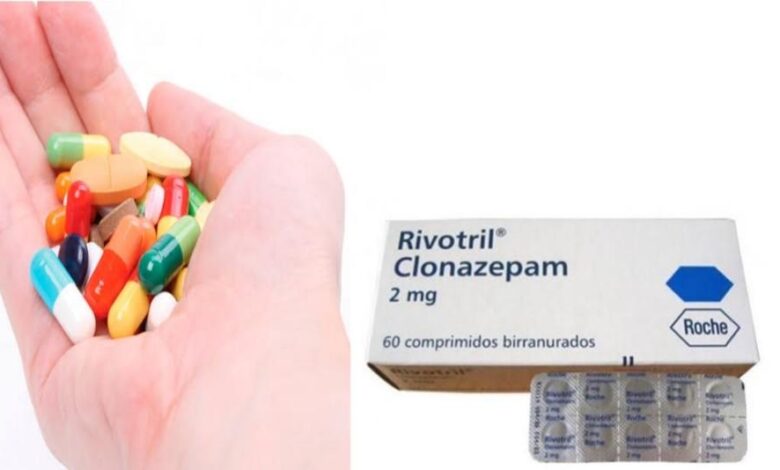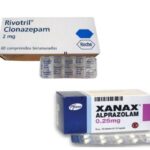What Not To Take With Clonazepam

Clonazepam, sold under the brand Klonopin, Rivotril among others, is a medication used to prevent and treat seizures, panic disorder, anxiety, and the movement disorder known as akathisia. It’s a prescription drug that’s used in people with:
- Seizure disorders. Clonazepam is used to treat several types of seizures in adults and children. It may be used alone or together with other drugs for this use.
- Panic disorder. Clonazepam is used short term in adults to treat symptoms of panic disorder, including panic attacks. With a panic attack, you have sudden, intense feelings of fear or discomfort. Or, you feel threatened with no clear cause.
Clonazepam belongs to a class of drugs called benzodiazepines. A class of drugs is a group of medications that work in a similar way. These drugs are often used to treat similar conditions.
Clonazepam works by increasing the activity of gamma aminobutyric acid (GABA). This is a chemical that sends signals throughout a person’s nervous system. If a person does not have enough GABA, their body may be in an excited state. This may cause them to have panic attacks or seizures. When a person takes this drug, they will have more GABA in their body. This will help them have fewer panic attacks and seizures.
What is drug interaction?
A drug interaction can be defined as an interaction between a drug and another substance that prevents the drug from performing as expected. This definition applies to interactions of drugs with other drugs (drug-drug interactions), as well as drugs with food (drug-food interactions) and other substances.
Whenever two or more drugs are being taken, there is a chance that there will be an interaction among the drugs. The interaction may increase or decrease the effectiveness of the drugs or the side effects of the drugs. The likelihood of drug interactions increases as the number of drugs being taken increases. Therefore, people who take several drugs are at the greatest risk for interactions. Drug interactions contribute to the cost of healthcare because of the costs of medical care that are required to treat problems caused by changes in effectiveness or side effects. Interactions also can lead to psychological suffering that can be avoided. This review discusses the issue of drug interactions and several ways to avoid them.
What Not To Take With Clonazepam
Avoid the following medications while taking clonazepam:
- Opioid pain or cough relievers (such as codeine, hydrocodone), alcohol, marijuana (cannabis)
- Drugs for sleep or anxiety (such as alprazolam, lorazepam, zolpidem)
- Muscle relaxants (such as carisoprodol, cyclobenzaprine)
- Antihistamines (such as cetirizine, diphenhydramine).
Tell your doctor and pharmacist what other prescription and nonprescription medications, vitamins, and nutritional supplements you are taking or plan to take. Be sure to mention any of the following:
- Amiodarone (Cordarone, Nexterone, Pacerone)
- Antibiotics such as clarithromycin (Biaxin, in Prevpac), erythromycin (Erythrocin, E-mycin, others), and troleandomycin (TAO) (not available in the US)
- Antidepressants
- Certain antifungal medications such as itraconazole (Onmel. Sporanox) and ketoconazole (Nizoral)
- Antihistamines
- Certain calcium channel blockers such as diltiazem (Cardizem, Tiazac, others) and verapamil (Calan, Covera, Verelan, in Tarka)
- Cimetidine (Tagamet)
- HIV protease inhibitors including indinavir (Crixivan), nelfinavir (Viracept), and ritonavir (Norvir, in Kaletra)
- Medications for anxiety, colds or allergies, or mental illness
- Other medications for seizures such as carbamazepine (Epitol, Tegretol, Teril), phenobarbital, phenytoin (Dilantin, Phenytek), or valproic acid (Depakene); muscle relaxants; nefazodone; rifampin (Rifadin, Rimactane)
- Sedatives
- Certain selective serotonin reuptake inhibitors (SSRIs) such as fluvoxamine (Luvox)
Your doctor may need to change the doses of your medications or monitor you carefully for side effects. The risk of serious side effects (such as slow/shallow breathing, severe drowsiness/dizziness) may be increased if this medication is taken with These products that may also cause drowsiness or breathing problems.
Check the labels on all your medicines (such as allergy or cough-and-cold products) because they may contain ingredients that cause drowsiness. Ask your pharmacist about using those products safely.
How to avoid drug interactions
Talk to your doctor or pharmacist to get the most accurate and up-to-date information about your personal risk of drug interactions. Make sure they know all of the medications you are taking.
Have a clear conversation about potential foods, OTC drugs, and diseases that could cause problems when combined with your medications.
Some questions to ask:
- How exactly does this drug work in my body? What potential side effects may I experience?
- Can I take this medication with my other prescriptions? If so, should I take it at a different time than my other medications?
- I also take the following OTC drugs, herbs, vitamins, or supplements. Is this drug safe to take with them?
- Are there any specific foods or beverages that I should avoid when I’m taking this drug? If so, why?
- What potential effect could alcohol consumption have while taking this drug?
- Can you also explain the signs of a drug interaction that I should look out for?
- What should I do if I experience severe side effects or a drug interaction?
- I’d like more information about this drug. Can you provide me with a copy of the package insert? If not, where can I find it online?
- (If applicable) Can I take this drug while I’m pregnant or breastfeeding?
- Can this drug be crushed or chewed if I find it hard to swallow, or mixed with food or drink to mask its taste?
If you have any concerns or questions about medications you’re taking or planning to take, consult with your doctor. In particular, women who are pregnant or breastfeeding should check with their doctor before taking any new medications.





